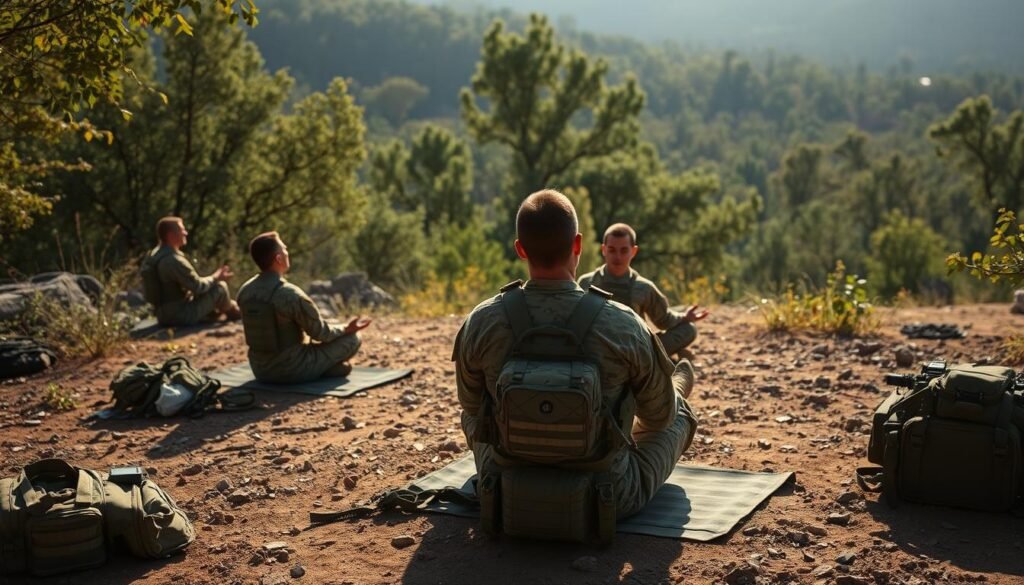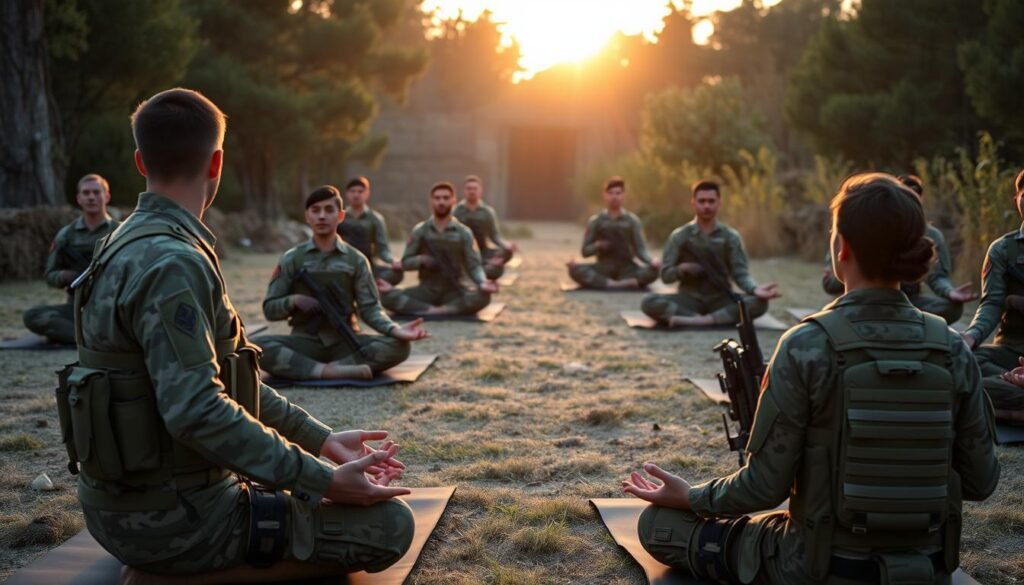In 2014, Army data showed a scary fact. Fatigue led to 628 accidents and 32 deaths. This shows the huge impact fatigue has on service members. It’s essential for them to handle fatigue well to stay ready for anything. Around 14% of soldiers had sleep disorders that year. This shows how widespread sleep problems are in the military. Not getting enough sleep can cause big health problems, like high blood pressure, sadness, and even dying sooner.
This article will share ways to fight military fatigue. Improving sleep, eating right, exercising, and being mentally strong are key. Knowing how lack of sleep affects you and finding ways to feel less tired are important. These steps can greatly improve a soldier’s abilities, health, and safety.
Key Takeaways
- Understanding fatigue’s impact on soldier safety can prevent accidents and injuries.
- Adequate sleep is vital for cognitive performance and operational efficiency.
- Nutritional strategies play a key role in enhancing endurance and recovery.
- Regular physical training can combat physical and mental fatigue effectively.
- Creating a sleep-friendly environment is essential for optimal soldier performance.
- Utilizing peer support can help manage stress and build resilience.
- Combat rest plans are crucial in mitigating the risk of mission failure.
Understanding Military Fatigue
Fatigue among service members affects how well they can do their jobs. It’s not just being tired. Military fatigue involves both mind and body. It can come from not enough sleep, too much stress, being sick, or certain medicines. Often, military culture makes the problem worse by valuing hard work more than rest.
Definition of Military Fatigue
Military fatigue is more than just being physically tired. It also means feeling mentally and emotionally wiped out. This can make it hard to make decisions quickly. Look at history. Gen. Robert E. Lee once went over 56 hours without sleep during a battle. Stories like his show the tough conditions and the deep fatigue our soldiers face.
Causes of Fatigue in Service Members
There are many reasons why soldiers get fatigued. Long hours of work with little rest is a big one. The stress from fighting can also weigh heavily on them. In 2014, 14% of soldiers had trouble sleeping. At Ranger School, soldiers often get only three hours of sleep a night. Clearly, staying awake and alert is a huge challenge.
To handle this, the military health community is looking into better sleep management. This is crucial for keeping soldiers sharp and ready. For more information, read about tackling Warfighter fatigue.
Impact of Sleep Deprivation on Performance
Sleep lack harms not just health but also the skills vital for military success. It affects a soldier’s emotional control and ability to make decisions. Knowing the impact is key to solving sleep problems among military members.
Effects of Poor Sleep on Cognition and Reaction Times
Poor sleep badly affects thinking and how fast we react. Soldiers getting less than seven hours of sleep perform like they’re under the influence. About 76% of Army members don’t get enough sleep, compared to 37% of all U.S. adults. This shows the big challenges soldiers face.
How Sleep Deprivation Leads to Combat Issues
Sleep-deprived soldiers face serious combat issues. Those getting under five hours of sleep triple their risk of PTSD and depression. Lack of sleep hurts their awareness and can cause errors in combat. When soldiers sleep only four hours, their combat skill drops by up to 85%. This shows the need for better sleep habits in the military.
Combatting Military Fatigue: Essential Strategies
To fight military fatigue, it’s key to use some important strategies. By focusing on sleep, service members can boost their performance and well-being. Making a regular sleep schedule and taking naps before big operations helps a lot.
Implementing Sleep Management Techniques
Getting enough sleep is the first step to recovery. Adults should sleep for 7 to 9 hours each night, says the National Sleep Foundation. When service members sleep enough, they perform better.
Also, good sleep habits help a lot. Limiting time on screens before bed and making a calm sleep environment are good tips.
The Role of Nap Banking
Nap banking is a smart move for service members. It’s about getting extra sleep before times of hard work. By planning naps well, they can stay sharp and alert on missions.
It’s important to respect sleep in the military. Leaders should encourage rest as much as physical training for clearer thinking and better performance.
Nutrition’s Role in Enhancing Soldier Endurance
Proper nutrition is key to improving soldier endurance. It involves aspects like Meal Timing and the composition of meals. These impact a soldier’s energy and ability to think clearly, which is crucial for military tasks. Grasping these concepts can greatly enhance performance during important missions.
Meal Timing and Composition
It’s important to eat at the right time to keep energy high. Before a mission, soldiers should eat meals rich in carbs. This helps maintain energy during long activities. Adding protein and carbs aids in recovery and keeps blood sugar steady, important in combat. Drinks with caffeine can help with quick thinking and staying alert during hard tasks.
Hydration Effects on Physical Performance
Staying hydrated is linked to better performance. Not drinking enough can harm both the brain and body’s abilities. Drinking fluids with electrolytes and carbs is key for top performance. Soldiers need to drink more, especially around mission times, to avoid getting tired. Proper hydration supports doing well in operations, showing the importance of a managed diet in combat.

| Nutrition Factor | Effects on Endurance |
|---|---|
| Meal Timing | Enhances glycogen levels and maintains energy throughout missions |
| Carbohydrate Intake | Boosts physical performance, especially during sustained activity |
| Hydration | Prevents fatigue and supports cognitive and physical functions |
| Caffeine | Improves alertness and performance under stress |
| Protein and Carbohydrates | Supports recovery and stabilizes blood sugar levels |
Physical Training and Combat Stress Relief
Regular physical training is key in lowering stress and improving well-being for service members. Daily exercise lessens the physical and mental loads of military duties. Healthy bodies can better manage combat stress, making exercise an effective tool.
The Importance of Regular Exercise
Exercise is vital for soldiers’ mental health. Stress shows up physically, causing back pain, muscle tension, and headaches. Working out releases endorphins, which make you feel better. Running, lifting weights, and swimming are great for managing stress.
Exercise routines give a sense of control, helping to fight stress-related irritability and anxiety. They also build camaraderie, creating a supportive environment. Tools like the Breathe2Relax app help with relaxation techniques during intense training.
The table below shows stress symptoms and how regular exercise can help manage them:
| Symptoms | Management Strategies |
|---|---|
| Back Pain | Stretching and strength training |
| Tense Muscles | Yoga and Pilates classes |
| Headaches | Regular cardiovascular sessions |
| Nausea | Moderate intensity training |
| Trouble Sleeping | Evening exercise sessions |
| Fatigue | Structured physical fitness routines |
| Anxiety | Mindfulness-based exercises |
| Irritability | Group sports or team activities |
Regular physical activities greatly boost soldier morale and functionality. It’s crucial in combat and daily life to maintain a strong body. This resilience against stress leads to a healthier lifestyle.
Operational Readiness Enhancement through Sleep
Sleep is vital for the military’s effectiveness. Many service members do not get enough sleep. This can hurt their performance. Making sleep a priority helps keep the force ready and responsive.
Prioritizing Sleep for Optimal Performance
Service members need 7 to 8 hours of sleep each night for best performance. However, they often get only about 5.26 hours. Lack of sleep is similar to being over the legal alcohol limit. It’s dangerous for safety.
How to Create a Sleep-Friendly Environment
Creating a Sleep-Friendly Environment can improve sleep quality. Small changes can make a big difference. Here are some strategies:
- Reducing noise through soundproofing or using white noise machines.
- Controlling light exposure with blackout curtains or eye masks.
- Establishing a consistent sleep schedule to promote better sleep hygiene.
Commanders should support these practices to keep soldiers rested. A good sleeping environment improves combat readiness.
Warfighter Resilience Building Techniques
Developing Warfighter Resilience is key to managing stress and fighting fatigue in the military. Mindfulness and peer support are important for service members’ well-being.
Mindfulness and Relaxation Practices
Mindfulness includes meditation, deep breathing, and visualization. These help soldiers deal with military stress. Through them, service members find emotional balance and better focus.
Studies prove mindfulness lowers stress in high-pressure situations. Regular practice protects against stress from combat and other sources, like traumatic events. This includes tough tasks such as handling bodies during missions (source).
Peer Support Mechanisms for Stress Management
Strong peer support is critical for stress management. It lets service members share experiences, reducing loneliness. This helps them tackle both combat and everyday challenges together.
The relationships built on peer support improve coping methods. They make talking about mental health easier. Families of deployed members also benefit from support networks (learn more).
| Technique | Benefits |
|---|---|
| Mindfulness Practices | Improved focus, emotional balance, stress reduction |
| Peer Support Mechanisms | Shared experiences, community building, enhanced coping |
| Relaxation Techniques | Lowered anxiety levels, increased resilience, stress relief |
These methods boost service members’ resilience. They face military life ready and supported. Focusing on mindfulness and peer support helps them switch between combat and personal life smoothly.
Battlefield Fatigue Mitigation Strategies
In high-stakes military settings, effective crew rest plans are key for Battlefield Fatigue Mitigation. Soldiers need proper downtime to recover both body and mind. This is vital for staying effective on operations. Without enough rest, fatigue can badly affect decision-making and mission performance.
Effective Crew Rest Plans
Well-organized rest plans let soldiers get the rest they need. These plans must include rotation schedules. They should balance rest and mission needs. It’s important to consider environmental aspects and each soldier’s needs. This makes rest plans work better.
Weight Management for Combat Readiness
Managing gear weight is also critical for staying ready for combat. Too much gear can tire soldiers out quickly. This reduces their ability to operate effectively. It’s a balance between having enough equipment and preventing fatigue. Using a balanced approach helps maintain stamina and quickness. Regular checks of body weight and gear load enhance fatigue mitigation efforts. This is crucial for achieving mission goals.

Tactical Performance Optimization Methods
Understanding and managing combat stress is key to excellent tactical performance. Soldiers often face hard situations causing stress. This can reduce mental clarity and physical strength. This section discusses ways to enhance performance.
Understanding and Managing Combat Stress
Combat stress is common in military missions. It shows up as anxiety, fear, and emotional pressure. Handling these conditions helps improve performance. Soldiers learn to control their responses in stressful situations.
- Controlled Stress Exposure Training: Realistic, high-pressure training builds soldiers’ resilience, leading to superior real-world performance.
- Coping Mechanisms: Mindfulness and deep breathing reduce stress. They keep the mind clear and focused.
- Post-Combat Recovery: Soldiers need time for physical and mental rest after action. Spotting burnout and exhaustion signs, like headaches and irritability, keeps them effective.
Research from past wars shows how combat affects the body. In World War II, many soldiers had stress-related symptoms. This includes losing control over bowel and bladder functions. It shows the need for good stress management.
Understanding soldiers’ physiological readiness by Grossman is important. It shows how different states of readiness impact performance. Being well-rested and relaxed is crucial for maintaining good performance.
| Condition | Description |
|---|---|
| Condition White | Resting heart rate, optimal for recovery. |
| Condition Yellow | Alert and prepared, ideal for engagement. |
| Condition Red | Combat active, stress levels may rise. |
| Condition Black | Overwhelmed by stress, nearly incapacitated. |
Special Operations Fatigue Countermeasures
Special Operations teams face tough challenges due to hard missions and weird schedules. They can do better and make smarter choices with Advanced Sleeping Strategies. It’s really important to handle their fatigue to stay ready and effective.
Advanced Sleeping Strategies for Special Forces
For Special Forces, staying sharp is critical. Here are some tips to fight off tiredness:
- Controlled Rest Cycles: Planning short rest times can keep you alert and strong during missions.
- Strategic Napping: Taking quick naps can really help, especially if your sleep gets messed up by missions.
- Sleep Hygiene Practices: Having a regular sleep schedule helps you sleep better and fight tiredness.
Given the risky situations they’re in, we’ll keep looking for sleep strategies that meet their needs. These methods are key for Special Ops folks.

Conclusion
Fighting military fatigue improves Service Member Wellness and helps soldiers work better. It’s crucial to handle sleep, eating, exercise, and mental strength well. By using these strategies, military people can meet their tough job needs.
It’s key to see how fatigue affects performance. For example, fatigue played a role in 21-23% of big plane crashes. The crash of Air India Express Flight 812 shows how lack of sleep causes big mistakes. We must focus on Combatting Military Fatigue.
To beat fatigue, soldiers must understand its signs, causes, and ways to manage it. For tips on better adrenal health and fighting fatigue, click here: natural remedies for adrenal fatigue. Such care is vital for their well-being, making them resilient and always ready.